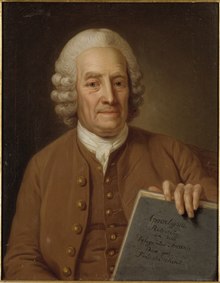Author:Emanuel Swedenborg
Works edit
Scientific and philosophic works edit
- Principles of Chemistry (1720)
- Miscellaneous Observations (1722)
- The Principia (1734)
- The Infiinite and Final Cause of Creation (1734)
- The Economy of the Animate Kingdom (1740-1741)
- The Fiber (1741)
- The Rational Psychology (1743)
- The Animal Kingdom (1744-1745)
- The Worship and Love of God (1745)
Theological works edit
- Arcana Coelestia, The Heavenly Arcana Contained in the Holy Scripture or Word of the Lord, Unfolded (1749-56)
- Earths in the Universe (1758)
- Heaven and Hell (1758) (transcription project)
- Last Judgement (1758)
- The New Jerusalem and its Heavenly Doctrine (1758)
- The White Horse (1758)
- The Four Doctrines; The Lord, The Sacred Scripture, Life, Faith (1763)
- Continuation of the Last Judgement (1763)
- Divine Love and Wisdom (1763)
- Divine Providence (1764)
- The Apocalypse Revealed, wherein are disclosed the Arcana there foretold, which have hitherto remained concealed (1766)
- The Delights of Wisdom pertaining to Conjugial love
- A Brief Exposition of the Doctrine of the New Church (1769)
- Interaction of the Soul and Body (1769)
- True Christian Religion (1771)
Works about Swedenborg edit
Biographies edit
- Emanuel Swedenborg, Servus Domini (1904) by John Bigelow
- Swedenborg: Harbinger of the New Age of the Christian Church (1910) by Benjamin Worcester
- Emanuel Swedenborg, Scientist and Mystic (1948) by Signe Toksvig
Encyclopedia entries edit
- "Swedenborg, Emanuel," by Thomas Hitchcock in The American Cyclopædia (1879)
- "Swedenborg, Emanuel," by Charles Holbrook Mann in The New International Encyclopædia, New York: Dodd, Mead and Co. (1905)
- "Swedenborg, Emanuel," in Encyclopædia Britannica (11th ed., 1911)
- "Swedenborg, Emanuel," in The New Student's Reference Work, Chicago: F.E. Compton and Co. (1914)
Other edit
- "Swedenborg; or, the Mystic" in Representative Men by Ralph Waldo Emerson (1850)
Some or all works by this author were published before January 1, 1929, and are in the public domain worldwide because the author died at least 100 years ago. Translations or editions published later may be copyrighted. Posthumous works may be copyrighted based on how long they have been published in certain countries and areas.
Public domainPublic domainfalsefalse
